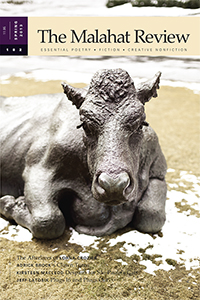Issues
Our Back Pages
Issue #182
Issue Date: Spring 2013
Editors: John Barton
Pages: 110
Number of contributors: 30
Buy Issue 182: Print Edition

The first thing that greets the reader when they pick up Issue 182 is the image of a calm bovine figure with long lashes kneeling on a snowy ground. The cover photo, taken by Joe Fafard (1942 – 2019), is a portrait of one of the cow sculptures in Fafard’s “The Pasture,” a public art piece at Toronto’s Dominion Centre. Delve inside the issue and you will find more on Fafard’s sculptures in two poems by Maureen Scott Harris titled “Joe Fafard’s Cows: ‘The Pasture’” and “Joe Fafard’s Cows: Elinor, Valadon, Potter.’” Harris depicts Fafard’s sculpture as a reminder of Toronto’s rural past, where the city is “haunted / by the cattle that once browsed this pasture / in sight of the lake—when the city was a village / and seven cows a fortune.”
Also featured in this issue are six poems by the University of Victoria’s Writing Department Professor Emerita, Lorna Crozier. “The Afterlife,” a prose poem split into five parts, parses the idea of the afterlife with Crozier’s typical blend of wit and insight and asks the question “before you worry about the afterlife, shouldn’t you consider what / went on before?” The last of Crozier’s poems, “Book of Small Mistakes,” documents the minutiae of a crumbling marriage, including the seemingly small mistakes of neglecting to clean up crumbs in the kitchen and leaving a red shirt in the white laundry, which snowball into larger problems. Only at the end of the poem do we glimpse the real crisis underlying this relationship when we are told that “a small mistake…/should be the size of a screw that holds the hands / of a watch together, the size of a spot before it becomes / a melanoma, the size of one eyelet / in a child’s white shoe / she never had the chance / to lace and tie.”
Other works of note in this issue include two poems by Stephanie Bolster, a creative nonfiction piece by Kirsteen MacLeod, and Cody Klippenstein’s short story “Dainty, Pretty Things.” Klippenstein’s story ends the issue with a genre that feels like speculative fiction crossed with a cowboy western. It is a surreal piece that cuts to the quick with characters who “crave dainty, pretty things,” but are immersed in a harsh, violent world. Klippenstein artfully explores the concepts of vulnerability, caring, and intimacy in a setting that has no room for these.
—Rose Morris









